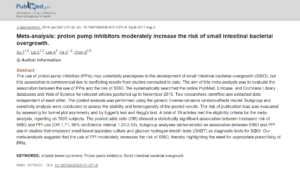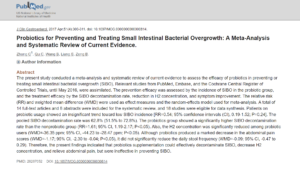Preventing and Reversing Damage from Acid Lowering Medications
Acid lowering medications have a known list of side effects. Fortunately, there are steps you can take to both protect against and even reverse the damage they cause.
Dr. Michael Ruscio, DC: Hey, everyone. This is Dr. Ruscio. Let’s discuss how probiotics can help prevent some of the negative effects from PPI or acid-lowering medication use. And I’d like to share with you the results of a study that I found very interesting. I’ll put the abstract up here on the screen. The study entitled “Lactobacillus Versus Placebo for the Prevention of Proton Pump Inhibitor-Induced Irritable Bowel Syndrome: A Randomized Clinical Trial.”
[Continue reading below]
Dr. R’s Fast Facts Summary
- Patients on proton pump inhibitors (PPI) (Pantoprazole) for 6 months
- Were given either placebo or lactobacillus probiotic (category 1)
- Compared to control, probiotic group experienced improved:
- Bloating, flatulence, stool form, stool frequency
- Conclusion:
- Lactobacillus supplementation prevents bowel symptoms onset in patients on long-term proton pump inhibitors.
- PPIs have been shown to increase risk of SIBO according to very high-quality evidence
- Meta-Analysis: Proton pump inhibitors moderately increase the risk of small intestinal bacterial overgrowth
- “Our meta-analysis suggests that the use of PPI moderately increases the risk of SIBO, thereby highlighting the need for appropriate prescribing of PPIs.”
- Meta-Analysis: Proton pump inhibitors moderately increase the risk of small intestinal bacterial overgrowth
- Other high quality data show probiotics can treat SIBO
- Probiotics for Preventing and Treating Small Intestinal Bacterial Overgrowth: A Meta-Analysis and Systematic Review of Current Evidence.
- “Therefore, the present findings indicated that probiotics supplementation could effectively decontaminate SIBO, decrease H2 concentration, and relieve abdominal pain…”
- Probiotics for Preventing and Treating Small Intestinal Bacterial Overgrowth: A Meta-Analysis and Systematic Review of Current Evidence.
What to Do?
1) Investigate what is causing your need for a PPI
- Imbalance in the gut?
- Poor choice in diet?
2) Use a high quality probiotic
**More specifics on diet and probiotics are provided in Healthy Gut, Healthy You
Use of PPIs
- In most cases PPIs should only be used for 4-8 weeks
- Get help with Acid Lowering Medications.
- Get your personalized plan for optimizing your gut health with my new book.
- Healthcare providers looking to sharpen their clinical skills, check out the Future of Functional Medicine Review Clinical Newsletter.
DrMR: And essentially the setup of the study was looking at a group of patients who were on pantoprazole, which is an acid-lowering PPI medication. And half of those subjects were given a probiotic. And the other half were given a placebo. So this is the control group. And this is the treatment group. The treatment got the probiotic. And the placebo group was the control group.
And what they found was the use of a probiotic could prevent the following symptoms: bloating, flatulence, stool form alterations that were negative, and stool frequency that was negative. And so this, of course, looks very much like IBS. And this study then concluded that Lactobacillus supplementation prevents bowel symptoms onset in patients on long term proton pump inhibitors.
So again, they found that the use of probiotics could prevent symptoms of IBS in those on acid-lowering medications.

So we see that lowering acid can increase the risk for bacterial overgrowth. And the question is, why is this? Well, when you lower acid, acid helps to kill bacteria. And so the theory is that when we lower acid too much, part of your natural defense against bacteria overgrowing is now gone. And so this opens the door for bacterial overgrowth.
“We’ve shown that acid-lowering medications increase the risk of having small intestinal bacterial overgrowth”
Now, bacterial overgrowth we know can underlie the symptoms of IBS. Now, estimations vary. It may be a minority of cases. It may be a majority of cases. But we do know there is a connection between bacterial overgrowth (or more namely, small intestinal bacterial overgrowth, but not limited to small intestinal bacterial overgrowth) and the symptoms of IBS.
So we’ve shown that acid-lowering medications increase the risk of having small intestinal bacterial overgrowth. And we know that small intestinal bacterial overgrowth is associated with IBS. We’ve also shown in this one study that probiotics can reduce the negative symptoms that are seen from longer term use of acid-lowering medication.
So this would suggest that probiotics may be able to combat SIBO (or small intestinal bacterial overgrowth) because if the acid-lower medication increases bacterial overgrowth and then bacterial overgrowth causes these symptoms, then if we see the use of probiotics showing a reduction in symptoms, it would like tell us that a probiotics is combating overgrowth.

They conclude, “Therefore, the present findings indicated that probiotic supplementation could effectively decontaminate SIBO (small intestinal bacterial overgrowth), decrease hydrogen concentrations, and relieve abdominal pain.”
Sponsored Resources
We’ve discussed previously that your mouth is the first section of your gut. So in order to have a healthy gut, you have to have a healthy mouth. That’s why I like Quip’s electric toothbrush which is ADA approved. That’s the American Dental Association.

What I like about Quip also is that their electric toothbrush starts at $25, which is much cheaper than most electric toothbrushes. If you go to GetQuip.com/RuscioPodcast, you’ll get your first refill pack free with a purchase of Quip’s electric toothbrush. That’s you’re first refill pack free at GetQuip.com/RuscioPodcast.
Now, they did not find in this meta-analysis that probiotics can prevent the occurrence of SIBO. But they did find that probiotics can treat SIBO. So what we’re seeing here essentially is if you take an acid-lowering medication in the long term, that may cause bacterial overgrowth. And probiotics may be able to prevent that. So that’s great.
So what you should do if you’re on an acid-lower medication is, one, you should try to find what the reason for that is. It could be something like SIBO. It could be a poor choice in diet. It could be other imbalances in the flora in your gut. And that’s definitely something important to look into.

And if you want more information in terms of what dietary changes you may be able to make to help with reflux or GERD or heartburn that may be prompting the need for the PPI or you’d like a good, specific probiotic protocol outlined, then I’d encourage you to have a look at Healthy Gut, Healthy You where I elaborate on all this.
But in sum, we’re seeing more evidence showing the beneficial role of probiotics. And regarding PPIs, I think that we can make a case for using PPIs in the short term to help heal. Especially if someone has an ulcer, the heal rate has been documented at about 80 to 90% with the use of PPIs for four to eight weeks.
So for four to eight weeks, I think we can make a case for these. In this study, they were looking at six months of administrations of PPIs which is probably not a good idea unless someone really has to be on them because there are other side effects to contend with. Here we’re seeing evidence of small intestinal bacterial overgrowth and evidence of formation of IBS. So it’s important not to look at a PPI and acid-lowering medication as a viable long term solution but also be open to these in the short term to provide some healing.
And if you’re in need of more guidance, please look at the book Healthy Gut, Healthy You. It will help walk you through some of these specifics like dietary changes and probiotic protocols which can be very powerful in helping to remedy some of these underlying causes.
So in any case, this is Dr. Ruscio. And I hope this information helps you get healthy and get back to your life. Thanks.
What do you think? I would like to hear your thoughts or experience with this.
- Get help using this information to become healthier.
- Get your personalized plan for optimizing your gut health with my new book.
- Healthcare providers looking to sharpen their clinical skills, check out the Future of Functional Medicine Review Clinical Newsletter.
Dr. Ruscio is your leading functional and integrative doctor specializing in gut related disorders such as SIBO, leaky gut, Celiac, IBS and in thyroid disorders such as hypothyroid and hyperthyroid. For more information on how to become a patient, please contact our office. Serving the San Francisco bay area and distance patients via phone and Skype.
Discussion
I care about answering your questions and sharing my knowledge with you. Leave a comment or connect with me on social media asking any health question you may have and I just might incorporate it into our next listener questions podcast episode just for you!